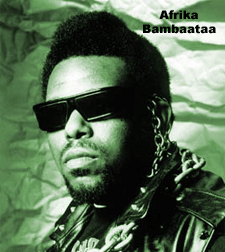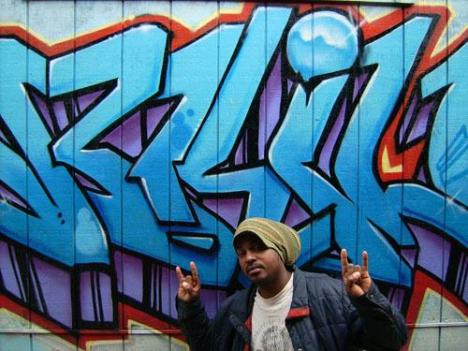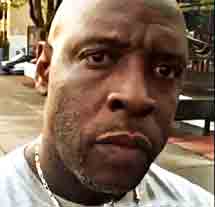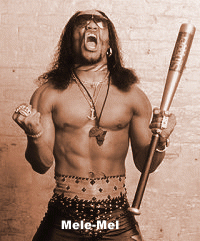 November marks Hip Hop History Month and hence we wanna kick things off by highlighting the work and perspective of one of Hip Hop’s founding fathers Afrika Bambaataa and the Universal Zulu Nation who celebrate their 40th anniversary this year (2013) Included below are a couple of short clips from documentaries where Bam speaks about Hip Hop culture and Zulu Nation.. The last one is a long interview done by myself and writer Mark Skillz, where Bam opens up and gives an in-depth History lesson.. I also included an article written back in the 90s called From Gangs to Glory
November marks Hip Hop History Month and hence we wanna kick things off by highlighting the work and perspective of one of Hip Hop’s founding fathers Afrika Bambaataa and the Universal Zulu Nation who celebrate their 40th anniversary this year (2013) Included below are a couple of short clips from documentaries where Bam speaks about Hip Hop culture and Zulu Nation.. The last one is a long interview done by myself and writer Mark Skillz, where Bam opens up and gives an in-depth History lesson.. I also included an article written back in the 90s called From Gangs to Glory
Afrika Bambaataa breaks down the history of the Universal Zulu Nation this is from a BBC documentary
http://www.youtube.com/watch?v=vq1ONZ7R6IQ&feature=player_embedded#!
http://www.youtube.com/watch?v=k8IO2KHjXZg&feature=related
In this interview Afrika Bambaataa gives an in depth look at what Hip Hop was like during the early days in the 1970s.. He talks about the importance of Funk Music.. He talks about the early gangs and the culture of violence. The forming of Zulu nation and the racial tensions that existed in NY as Hip Hop was forming.. Bambaataa also breaks down many of the myths surrounding early Hip Hop.
http://www.youtube.com/watch?v=eL1YntDNRHo
ZULU NATION: FROM GANGS TO HIP HOP GLORY
by – Davey D
 First thing we wanna do is offer up our congratulations to Hip Hop’s oldest and largest organization, the Universal Zulu Nation. They are set to celebrate their 29th Anniversary this weekend [November 8-10] where they will be paying tribute to soul music and funk music Godfathers, Sly Stone, James Brown, and George Clinton. They will also pay tribute to Hip Hop’s seminal figures Kool DJ Herc, Grandmaster Flash and Afrika Bambaataa.. For those who are unfamiliar with the Zulu Nation, they began as an organization founded by Afrika Bambaataa at Stevenson High School in the Bronx. Back than it was simply known as ‘The Organization‘.
First thing we wanna do is offer up our congratulations to Hip Hop’s oldest and largest organization, the Universal Zulu Nation. They are set to celebrate their 29th Anniversary this weekend [November 8-10] where they will be paying tribute to soul music and funk music Godfathers, Sly Stone, James Brown, and George Clinton. They will also pay tribute to Hip Hop’s seminal figures Kool DJ Herc, Grandmaster Flash and Afrika Bambaataa.. For those who are unfamiliar with the Zulu Nation, they began as an organization founded by Afrika Bambaataa at Stevenson High School in the Bronx. Back than it was simply known as ‘The Organization‘.
Bam who once lived the gang lifestyle and was a Gang Lord was trying to change his ways and saw the newly formed group as a way out. Bam who was known for reading and staying up on the teachings of Elijah Muhammad and other African American leaders, changed the name to Zulu Nation after watching a movie of the same name that told the tale of the well known South African tribe.. Bam was inspired by their resistance to Dutch settlers. As Hip Hop became popular, the group became known as the Mighty Zulu Nation and as later the Universal Zulu Nation.
The story behind the evolution of UZN is significant. Back in the days Zulu’s struck fear in many who lived outside of their Bronx River Housing Project strong hold. While they gave birth to Hip Hop’s first B-Boys and B-Girls, the group for the most part was made up of former gang members. Many of them from the Notorious Black Spades which once reigned terror throughout the Bronx in the early to mid 70s. It used to be a really big deal for cats to hang out at Bronx River and not get stuck up. It was a sign of toughness and brought much prestige.
 Many of the early crews tried to associate themselves with Zulu Nation for protection from roving bands of stick up kids and other gangs turned crew. It was in this backdrop that Bambaataa and other conscious brothers spent a lot of time teaching and preaching and working with Zulu members to bring about positive change. Bam often talks about how he would do simple things like bestow titles like ‘King’ and ‘Queen’ upon Zulu members in an attempt to instill pride and confidence. His feeling was that if you treated people like royalty then they would turn around and act like royalty in their actions. As Bam’s recording career blew up, he saw too it that many of folks who were from the streets got an opportunity to go on tour with him and the Soul Sonic Force. Sometimes they were employed as roadies. Other times they worked as security. Again Bam’s main objective was to see to it that local cats got a chance to see there was a much bigger world outside the Bronx.
Many of the early crews tried to associate themselves with Zulu Nation for protection from roving bands of stick up kids and other gangs turned crew. It was in this backdrop that Bambaataa and other conscious brothers spent a lot of time teaching and preaching and working with Zulu members to bring about positive change. Bam often talks about how he would do simple things like bestow titles like ‘King’ and ‘Queen’ upon Zulu members in an attempt to instill pride and confidence. His feeling was that if you treated people like royalty then they would turn around and act like royalty in their actions. As Bam’s recording career blew up, he saw too it that many of folks who were from the streets got an opportunity to go on tour with him and the Soul Sonic Force. Sometimes they were employed as roadies. Other times they worked as security. Again Bam’s main objective was to see to it that local cats got a chance to see there was a much bigger world outside the Bronx.
Change didn’t happen over night, but today the testament to all that hard work is the fact that there are vibrant Zulu chapters in more than 20 countries all over the world with estimated membership of over 10 thousand. They have come to embrace and preserve Hip Hop’s key elements and have exemplified what is often considered Hip Hop’s 5th Element-‘Knowledge‘.
 To me the beauty of it all is seeing what was once considered a ‘ruthless gang’ evolve’ to a group that has strived and succeeded in serving the community. There are all sorts of stories about Zulus ridding their housing projects of drug dealers and many of the older guys spending time mentoring younger people. There are stories about Zulus escorting women to and from their apartments as well as looking out and helping those in need. This of course is in addition to various Zulu chapters that have involved themselves in local politics including the fight to Free Mumia and get him a new trial. We also can not overlook the fact that it was Zulu Nation members who put out some of Hip Hop’s first records as well as among the first to establish Hip Hop’s first radio shows. Who could forget Zulu Beats with Afrika Islam on WHBI. It’s a shame that there hasn’t been more of a public celebration and acknowledgment of this organization and its accomplishments. In any case, props to them on their 29th anniversary.. For more information and a run down of this week’s schedule check out…http://www.zulunation.com/events.html
To me the beauty of it all is seeing what was once considered a ‘ruthless gang’ evolve’ to a group that has strived and succeeded in serving the community. There are all sorts of stories about Zulus ridding their housing projects of drug dealers and many of the older guys spending time mentoring younger people. There are stories about Zulus escorting women to and from their apartments as well as looking out and helping those in need. This of course is in addition to various Zulu chapters that have involved themselves in local politics including the fight to Free Mumia and get him a new trial. We also can not overlook the fact that it was Zulu Nation members who put out some of Hip Hop’s first records as well as among the first to establish Hip Hop’s first radio shows. Who could forget Zulu Beats with Afrika Islam on WHBI. It’s a shame that there hasn’t been more of a public celebration and acknowledgment of this organization and its accomplishments. In any case, props to them on their 29th anniversary.. For more information and a run down of this week’s schedule check out…http://www.zulunation.com/events.html
by Davey D
Return to Davey D’s Hip Hop Corner



 This is the conversation we had with Apakalips a long time fixture in the San Jose rap scene who just released his masterpiece of a solo album called ‘The Otherside‘ Originally from Southern Cali, this community activist/ school teacher started out around 2002 with a group called Tributairies .They were best known for blowing up the Iguanas Cafe in downtown San Jose where they sparked off Lyrical Discipline.This was a weekly Friday night gathering which attracted emcees from all over the South Bay who would come through and test their skills.It was done in the same vein as the Lyricist Lounge in NY, the Good Life in LA or the now legendary underground parties and freestyles sessions at 4001 Jackson street in Oakland put together by Mystik Journeymen and the Living Legends crew.
This is the conversation we had with Apakalips a long time fixture in the San Jose rap scene who just released his masterpiece of a solo album called ‘The Otherside‘ Originally from Southern Cali, this community activist/ school teacher started out around 2002 with a group called Tributairies .They were best known for blowing up the Iguanas Cafe in downtown San Jose where they sparked off Lyrical Discipline.This was a weekly Friday night gathering which attracted emcees from all over the South Bay who would come through and test their skills.It was done in the same vein as the Lyricist Lounge in NY, the Good Life in LA or the now legendary underground parties and freestyles sessions at 4001 Jackson street in Oakland put together by Mystik Journeymen and the Living Legends crew. The ‘Otherside‘ covers many topics including, California’s unique contributions to Hip Hop and its b-boy, b-girl tradition and its cultural influences. During our interview we talked about how Hip Hop is a form of communication and within it cultural expressions and activities like dance and rap go way beyond Hip Hop, and in fact are deeply rooted in traditional Mayan, Aztec and African traditions. Apakalips felt that it was important that we view Hip Hop with a larger historical and cultural lens.
The ‘Otherside‘ covers many topics including, California’s unique contributions to Hip Hop and its b-boy, b-girl tradition and its cultural influences. During our interview we talked about how Hip Hop is a form of communication and within it cultural expressions and activities like dance and rap go way beyond Hip Hop, and in fact are deeply rooted in traditional Mayan, Aztec and African traditions. Apakalips felt that it was important that we view Hip Hop with a larger historical and cultural lens.

























 Hope your are in the best of Health and your families. I was sent your e-mail by the Zulu-staff . I have been living in Europe for the past couple of months and been waking as many up to what we’re, doing in the states cause in some places they have the same problems with radio,especially the ones that copy The United States formats or programming of music. Then there are those specials stations that do have a balance of Ma’at on the airwaves and you hear it all.
Hope your are in the best of Health and your families. I was sent your e-mail by the Zulu-staff . I have been living in Europe for the past couple of months and been waking as many up to what we’re, doing in the states cause in some places they have the same problems with radio,especially the ones that copy The United States formats or programming of music. Then there are those specials stations that do have a balance of Ma’at on the airwaves and you hear it all.
 If you happen to be in New York, you may see a flyer being circulated around that is reminiscent of the old school flyers from back in the days. ‘By Popular demand DJ Cool Clyde, Lightnin Lance, The Nasty Cuzins, Quiet Az Kept Present their first annual Old School Reunion & Picnic’. It lets you know that the celebration for Disco King Mario is taking place Saturday August 18th at Rosedale ‘Big Park’ in the Bronx. The Big Park itself is legendary. When I was a kid living on Croes Avenue, we were absolutely forbidden to go across the street to the Big Park. That was because the Big Park was where many of many of the early Black Spades used to hang out. The Spades at that time were the largest and most notorious gang at that time. They eventually evolved to become The Mighty Zulu Nation. As for the Big Park, it eventually became the place where Disco King Mario would eventually throw many of his early gigs.
If you happen to be in New York, you may see a flyer being circulated around that is reminiscent of the old school flyers from back in the days. ‘By Popular demand DJ Cool Clyde, Lightnin Lance, The Nasty Cuzins, Quiet Az Kept Present their first annual Old School Reunion & Picnic’. It lets you know that the celebration for Disco King Mario is taking place Saturday August 18th at Rosedale ‘Big Park’ in the Bronx. The Big Park itself is legendary. When I was a kid living on Croes Avenue, we were absolutely forbidden to go across the street to the Big Park. That was because the Big Park was where many of many of the early Black Spades used to hang out. The Spades at that time were the largest and most notorious gang at that time. They eventually evolved to become The Mighty Zulu Nation. As for the Big Park, it eventually became the place where Disco King Mario would eventually throw many of his early gigs.